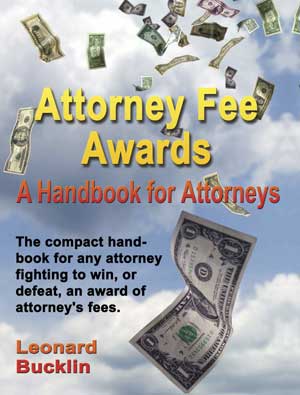
Attorney Fee Awards: A Handbook for Attorneys
Sample Text -- Handling the attorney fee award claim in settlement negotiations
The following text excerpt from Attorney Fee Awards is a sample of the concise, frank, and practical legal fees claim advice you get in this handbook, designed solely for busy litigation lawyers who want a no-nonsense approach. It illustrates the law and advice that is packed, crisply and compactly into this handbook to help both the proponent and the opponent in attorney fee award disputes.
This text excerpt is protected by copyrights. It is presented here to help you decide on your purchase of a handbook on attorney's fees. The footnotes and footnote citations included in the book's text have been deleted from this view of sample pages.
§ 12.01 Attorney fee award disposition in settlement
Most cases are settled; not tried. If a statute or case law regarding your lawsuit provides for an award of attorney fees to the prevailing party, take special notice of that attorney's statute or case law regarding legal fees, during your negotiations for settlement. If you are not explicit during settlement, questions arise whether the settlement was intended to include attorney's fees, and whether attorney fees were waived.
In the settlement agreement make it clear whether:
- there is a waiver of attorney fees as a part of the settlement, or
- the amount of attorney fees has been agreed upon, or
- the issue of attorney fees is outstanding — and the court retains jurisdiction of the case to decide that issue.
Most commonly, when cases are resolved by a settlement agreement, the parties end the case by a stipulation of dismissal. In Kokkonen v. Guardian
Life Insurance Co.,¹ the dismissal order entered by the parties' agreement neither incorporated the terms of the settlement in the body of the order nor reserved enforcement power in the court. The Kokkonen case held that enforcement of the settlement agreement was not a matter of a renewal or continuation of the original case but rather an entirely new contract beach cause of action. As such, the alleged breach of the settlement agreement had to be brought as a new action, one that the federal Kokkonen court observed would have to be brought in state court, because no federal cause of action was involved in a simple breach of contract case. So unless jurisdiction of the case is reserved to the trial court to enforce the settlement agreement, there will be problems of enforcement.
There is a further potential problem for the party that believes they prevailed in obtaining the settlement, perhaps even a settlement providing 100% of everything sought in the pleading filed in the case. The problem can arise because ---
- If the judge on the case does not believe you are a "prevailing party," then you are not entitled to an amount for attorney fees; no matter what the parties say is true; and
- You do not qualify as a "prevailing party" because of a settlement agreement — unless the settlement agreement is incorporated into an order of a court.
In the federal courts, Buckhannon v. West Virginia Department of Health and Human Resources,² mandated that unless a court has issued an order which creates a "material alteration of the legal relationship between the parties" or "a judicially sanctioned change in the legal relationship of the parties," then there is no "prevailing party" for an award of attorney fees. State decision law is tending to follow this pattern for the future. In short, if you represent the plaintiff, do not settle and dismiss the case, expecting an attorney fee to be awarded by the court because your settlement agreement paid the plaintiff money and everything else the plaintiff wanted.
On the other hand, if the settlement agreement is incorporated into the dismissal order, and the court retains jurisdiction to enforce the terms of the agreement in the order of dismissal, then the court's order of dismissal based on the settlement agreement becomes the legal equivalent of a consent decree on the merits. Note the two separate requirements: incorporation into the decree, and the court's retention of enforcement powers.
In a consent decree on the merits, a winning party can be a "prevailing party."³ A consent decree, in an appropriate case, may serve as the basis for an award of attorney's fees. If the consent decree does not include an admission of liability by the defendant, there needs to be some court-ordered change in the legal relationship between the parties.³ To define a plaintiff as a "prevailing party," defendants could agree to a declaration ordered by the court's consent decree that plaintiffs have certain rights or that defendant's procedures will be improved, or both. If there is neither a declaration of rights, nor an ordered change in what defendant will do in the future, nor an admission of liability, a court in an enforcement proceeding may decline to find the plaintiff was a "prevailing party" or award attorney fees.
WARNING. If the defendants insist on a nonadmission-of-liability clause in a settlement agreement, plaintiffs' counsel always should counter with an unshakable demand for: (1) additional or more specific language defining and implementing relief, (2) a specific agreement that plaintiffs are the prevailing party, and (3) a specific agreement that plaintiffs are entitled to attorney fees. Each of these three items must be included; otherwise a nonadmission-of-liability clause can be interpreted to mean that as a matter of law the plaintiff was not a prevailing party. The court can declare that the parties joint agreement that plaintiff is a "prevailing party" does not legally make it true, and the court's decision on the law can be otherwise than what the contract declares to be legally true.

Our "100% money back, No Questions Asked, Guarantee."
If you don't totally agree that the book with all its forms is worth every penny, simply tell us within 60 days to refund your money. You keep our book; we refund your money. What could be better!

